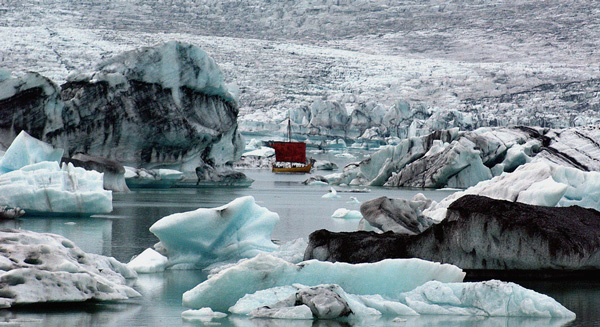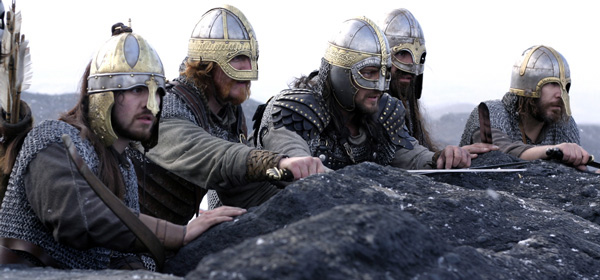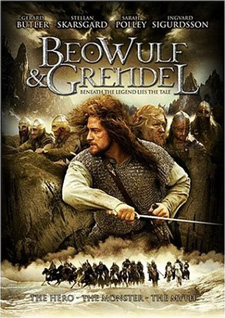Synopsis: Hrothgar, king of the Danes, and his band of warriors have raised up the great mead-hall, Heorot, to the glory of his reign, but his reign is troubled. The monster, Grendel, is terrorizing his people. The troll has gone so far as to storm Heorot itself to kill Hrothgar's subjects as they sleep. Hrothgar's friend, Beowulf, sails across the sea from Geatland to give the king what aid he can. He and his band of thirteen companions hunt the troll to no avail. Grendel has no grudge against the Geats, and will not attack them. Beowulf forms an attachment to the witch, Selma, who tells Beowulf that there is method to Grendel's rampage. When Beowulf's men finally track the monster to his lair, they find a way to provoke him. That night, Grendel offers battle, losing an arm in the struggle. The victorious Geats nail Grendel's arm above the mantle of Heorot, but their ordeal is not over. Grendel's mother is far more terrible than her son, and now she wants to avenge him..
Pedigree: Beowulf is one of the oldest pieces of literature in the English language. It was originally composed sometime between the 7th and 10th Centuries and in its original form, it probably translates and Christianizes a pagan Scandinavian poem or legend. It seems an odd choice for revival, but several films based on Beowulf have appeared in the last few years (with another on the way). Seamus Heaney's new translation of the poem was a best seller at the turn of the milennium. Most adaptations of Beowulf distill the poem down to the conflict between Beowulf and Grendel, the troll from the fens. Some of them remember Grendel's mother. Almost none of them adapt the second half of the poem, in which Beowulf meets his doom slaying a dragon. My own favorite variation on Beowulf is Dirty Harry, which is structurally and thematically similar (but that's another matter entirely).
Beowulf is likely to remain enternally popular because the poem taps primal archetypes near their source and mixes them into a phantasmagoria of monsters and blood. It's an ideal subject matter for filmmakers with a taste for horror movies. This particular movie hews pretty close to the poem in some places and ranges far afield of it in others. For the most part, the most potent images remain: Grendel's slaughter of the sleeping Danes, the victorious Danes nailing Grendel's arm to the wall, Beowulf's encounter with Grendel's mother under the lake (here translated as a cavern accessible only through a watery passage). Also for the most part, these images retain their power.
The Waste Land: This current film version of Beowulf was filmed in Iceland, which for most viewers is a strange and alien landscape. What is most striking about it is its almost complete absence of trees, which for me translated to the constant question of where the wood to build Heorot came from, but that's picking nits. Beowulf takes place in a Dark Ages conjured by the imagination, on the borderlands of myth and legend, and the alien landscapes of Iceland suit the story.

Revisionism: For all its faith in the esential imagery of the poem, this movie version indulges in some latter-day rethinking. Sarah Polley's character, Selma, is an invention of the filmmakers and suggests an unfortunate feminist critique of the myth (troubling given the rape to which she is subjected in a flashback). Additionally, she functions as a kind of mouthpiece for the filmmakers, providing Beowulf himself with the backstory of Grendel's grudge against Hrothgar, though most of her dialogue along these lines is stilted and artificial. This need for exposition is understandable, I suppose, given the revisionism going on with Grendel himself. The filmmakers give him a revenge motive, and recast him as a sympathetic character, a la John Gardner's Grendel. For some reason, this part of the movie got me to thinking about Ed Wood's Night of the Ghouls, with it's promise of "monsters to be pitied, monsters to be despised..." Perhaps the most annoying revision is the self-referential way in which the film depicts both the construction of the Beowulf myth and the Christianizing of a pagan narrative. At select points during the movie, we get snatches of the poem itself being constructed "new" around the campfire. The film seems impatient with Christianity, it should be noted, if not openly hostile towards it.

While the movie doesn't entirely transcend these various hobbles, the serious tone and committed performances by Gerard Butler as Beowulf and Stellan Skarsgard as Hrothgar invest the movie with a welcome gravity. The blissful lack of overt special effects helps, too, by providing the film with physical reality upon which to hang the myth. The myth itself is potent enough, even a milennium later. It's the strength of this film, actually, even if the filmmakers only trust it as far as it goes.

This film is being distributed on DVD by Anchor Bay and Union Station Media. The disc features a short featurette--excerpts from a video diary, one presumes--depicting the inclement weather conditions under which the film was made. There are several interview segments with the principles, deleted scenes, and galleries. The usual, in other words. The transfer of the movie itself is superb, as one might expect of so recent a production.
8/12/06